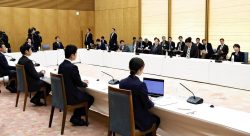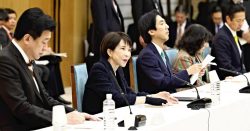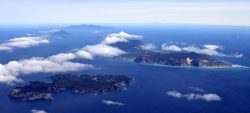Japan, China Foreign Ministers Prioritize Mutual Exchange; Security, Resource Exploitation Issues Remain Troublesome
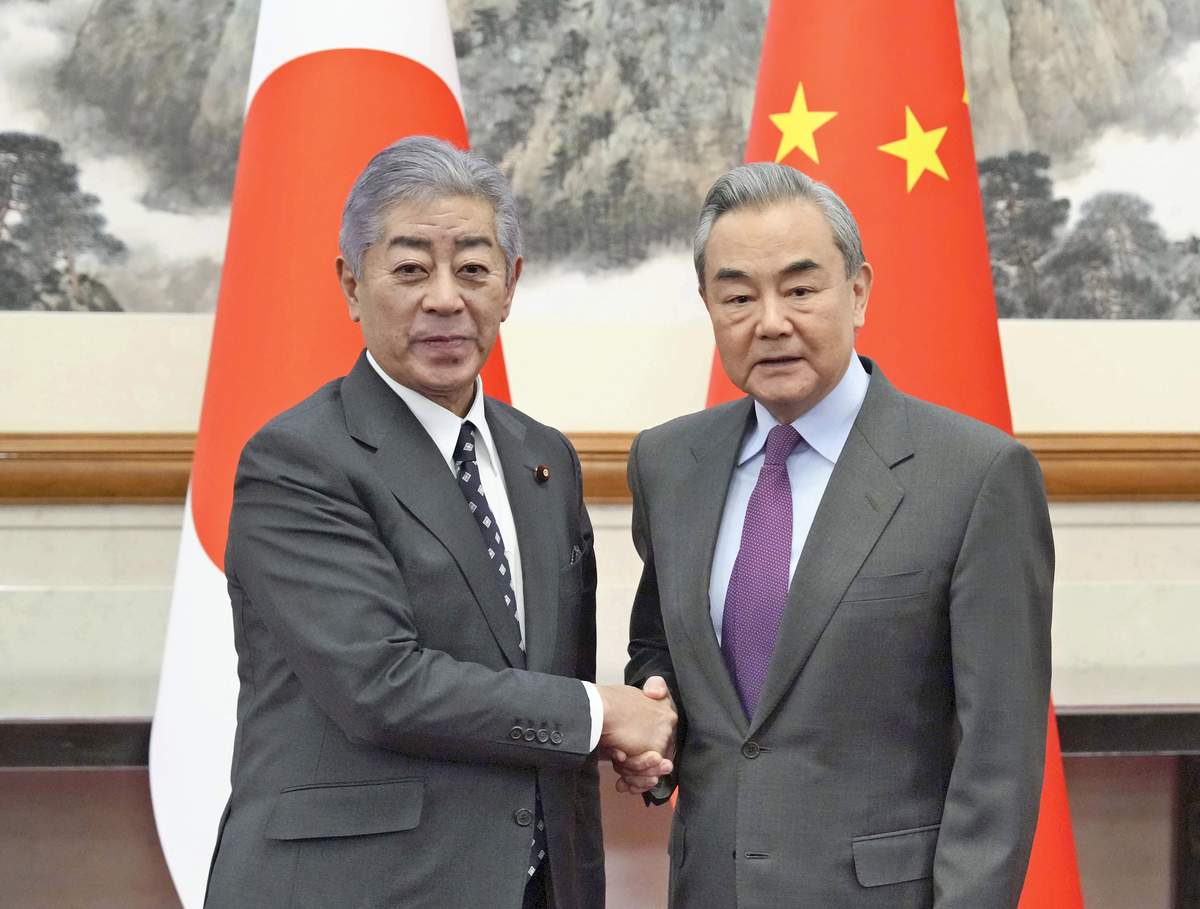
Foreign Minister Takeshi Iwaya, left, shakes hands with his Chinese counterpart Wang Yi in Beijing on Wednesday.
16:12 JST, December 26, 2024
BEIJING – Wednesday’s talks between Foreign Minister Takeshi Iwaya and his Chinese counterpart Wang Yi confirmed their desire to promote mutual exchange, thereby leading to progress in bilateral relations.
Such exchanges include a visit to Japan soon by Wang. However, pending issues — including the recent discovery of a buoy that is believed to have been installed by China in Japan’s exclusive economic zone — have cast a shadow over these proactive moves.
After meeting with Wang, Iwaya told reporters, “We had very frank, in-depth discussions on a wide range of issues.”
The talks, which included lunch, lasted an hour longer than originally scheduled. In-depth discussions continued at the High-Level People-to-People and Cultural Exchange Dialogue that took place afterward, amid concerns that Japanese and Chinese people’s deteriorating feelings about each other has hindered the improvement of bilateral relations.
A joint public opinion survey conducted by Japan and China in December found 87% of the Chinese respondents did not have a good impression of Japan, a sharp deterioration from previous surveys.
During the people-to-people dialogue, Japan announced it would relax visa requirements for Chinese nationals entering Japan for short-term stays, to encourage more Chinese tourists to visit Japan. It will introduce a new multiple-entry visa valid for 10 years and also increase the maximum stay for group tourists from 15 days to 30.
The announcement was partly in response to China’s resumption of short-term visa exemptions for Japanese nationals but also reflected the hope of stimulating interpersonal exchange to deepen mutual understanding.
“We must pay attention to the fact our two peoples’ impressions of each other have been unfavorable in recent years,” Wang said at the dialogue.
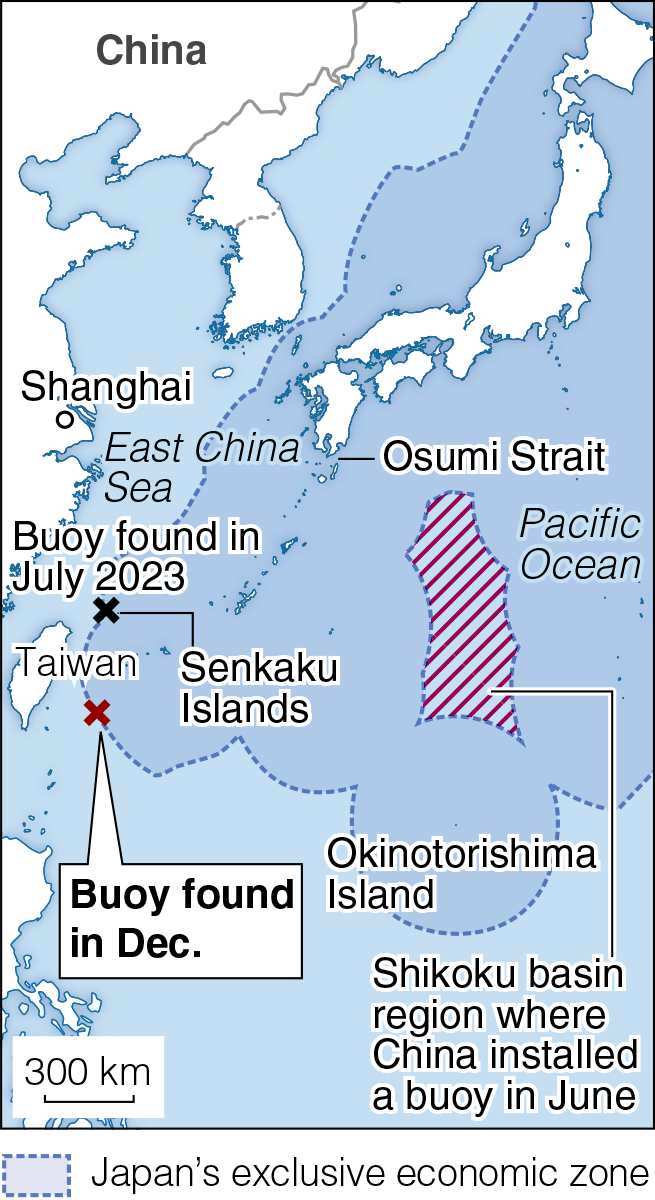
Japan had tried to use the trilateral framework of Japan, China and South Korea to move forward with sensitive Japan-China relations. With the political situation in South Korea becoming unstable, however, the focus is shifting toward improving relations between the two countries.
China’s active efforts to win over Japan serve as a tailwind for Japan, too, and Iwaya played his card by visiting China first, even though it was Wang’s turn to visit Japan this time in terms of diplomatic protocol.
Tokyo and Beijing have agreed that Wang will visit Japan early next year. Tokyo has drawn up a plan to also have Chinese Premier Li Qiang visit Japan in 2025, in anticipation that active summit diplomacy will make it easier to raise bilateral issues with China’s top leadership.
However, the number of pending issues, such as security and the exploitation of resources, has gone up instead of down.
“I don’t think a buoy was installed because of my visit [to China],” Iwaya told reporters.
Since July 2023, Chinese buoys have been found one after another in the waters around Japan. Tokyo has been calling for their removal, but Beijing has not responded. China has not eased its attempts to change the status quo.
“There are too many problems to say that relations are improving,” a senior official at the Japanese Foreign Ministry said.
China wins over Japan
BEIJING — At Wednesday’s meeting, Wang praised Iwaya by saying, “I would like to express my admiration for the way he consistently places importance on China-Japan relations as a politician with a wealth of experience.”
According to a Chinese government official, President Xi Jinping’s administration views the administration of Prime Minister Shigeru Ishiba as moderate toward China, and unlikely to cause friction over historical issues. China is expected to strengthen its ties with Japan in the future through various approaches including Wang’s visit to Japan.
Next year will mark the 80th anniversary of the end of the World War II, and China is sensitive to an anti-Japanese sentiment rising in the country. Wang referred to this point at the people-to-people dialogue and called for dialogue participants to face up to history.
At the same time, China believes it has common interests with Japan in areas such as free trade and the protection of supply chains, in preparation to counter U.S. President-elect Donald Trump, who takes a hardline stance against China.
Before the U.S. presidential election in November, China had softened its stance on Japan-China issues, taking a more conciliatory approach toward Japan.
However, China has not changed its stance on the issue of Taiwan and is expected to continue increasing its military build-up in the East and South China Seas. Security-related friction is unlikely to end in the future.
Top Articles in Politics
-

Japan PM Takaichi’s Cabinet Resigns en Masse
-

Sanae Takaichi Elected Prime Minister of Japan; Keeps All Cabinet Appointees from Previous Term
-

Japan’s Govt to Submit Road Map for Growth Strategy in March, PM Takaichi to Announce in Upcoming Policy Speech
-

LDP Wins Historic Landslide Victory
-

LDP Wins Landslide Victory, Secures Single-party Majority; Ruling Coalition with JIP Poised to Secure Over 300 seats (UPDATE 1)
JN ACCESS RANKING
-

Producer Behind Pop Group XG Arrested for Cocaine Possession
-

Japan PM Takaichi’s Cabinet Resigns en Masse
-

Man Infected with Measles Reportedly Dined at Restaurant in Tokyo Station
-

Israeli Ambassador to Japan Speaks about Japan’s Role in the Reconstruction of Gaza
-

Videos Plagiarized, Reposted with False Subtitles Claiming ‘Ryukyu Belongs to China’; Anti-China False Information Also Posted in Japan


